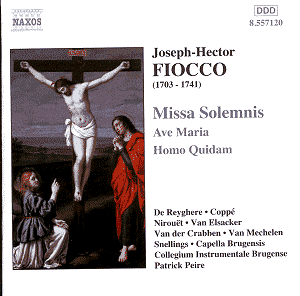Joseph-Hector Fiocco was the most significant
Flemish composer of the High Baroque period. His father, Pietro
Antonio Fiocco, was a Venetian composer who settled in Brussels
by 1682 and had 14 children by two wives. Naturally, Joseph-Hector
received his musical training from his father and also followed
his path in obtaining church positions where he was responsible
for the musical compositions to be used at services. Although
sacred choral music was Joseph-Hector’s primary compositional
mode, he did write some unaccompanied harpsichord works dedicated
to the Duke of Arenberg which were published in Brussels as his
Opus 1.
As with any relatively obscure composer from
the High Baroque period, the inevitable comparisons are made with
the master composers from the era such as Bach, Handel, Vivaldi
and Rameau. Essentially, Fiocco’s works incorporate both French
and Italian influences along the lines of the Galant style. Also,
Handel’s Italiante style is very much in evidence. Although Fiocco
does not attain the magnificent artistry of Handel, his music
is expertly constructed, flows beautifully, and is definitely
worthy of the attention of baroque music fans.
Concerning the performing artists, Patrick Peire
founded the Collegium Instrumentale Brugense about thirty years
ago, and the group has made many recordings for various record
labels including Fauré’s Requiem on René Gailly
and Gluck’s Orfeo ed Euridice on Forlane. Peire has also been
the director of the New Flemish Symphony Orchestra for the past
eight years.
Of the vocal soloists, Greta De Reyghere has
the singular honors in the Ave Maria and the Homo Quidam as well
as contributing to the Missa Solemnis. She is also the most well-known
of the singers, having joined the La Petite Band in recordings
of Bach Cantatas, Motets, and the Magnificat.
All performing elements are exceptional, and
I doubt that alternative forces could place Fiocco in a better
light than Peire and his period-instrument group. Recorded sound
is also excellent, allowing for much detail of Fiocco’s extensive
counterpoint.
I am particularly smitten with the two shorter
works which are joyful creations of gusto and wonderful lyricism;
Greta De Reyghere’s lovely and expressive voice adds greatly to
the listening pleasures as do the pungent strings. Fiocco’s Missa
Solemnis is a more serious work encompassing eighteen movements
and a wealth of emotional themes. Most appealing are a number
of virtuoso trumpet passages that heighten the work’s excitement
and regal nature.
Joseph-Hector Fiocco may reside on a side-road
of the Baroque repertoire, but Patrick Peire makes a strong case
for upgrading him to Main Street. Fiocco’s natural compositional
skills, his expert assimilation of the styles of the period, and
his knack for blending and contrasting voice with orchestra add
up to a highly desirable recording. If you have a warm spot for
Handel, you need to make room for Fiocco.
Don Satz
